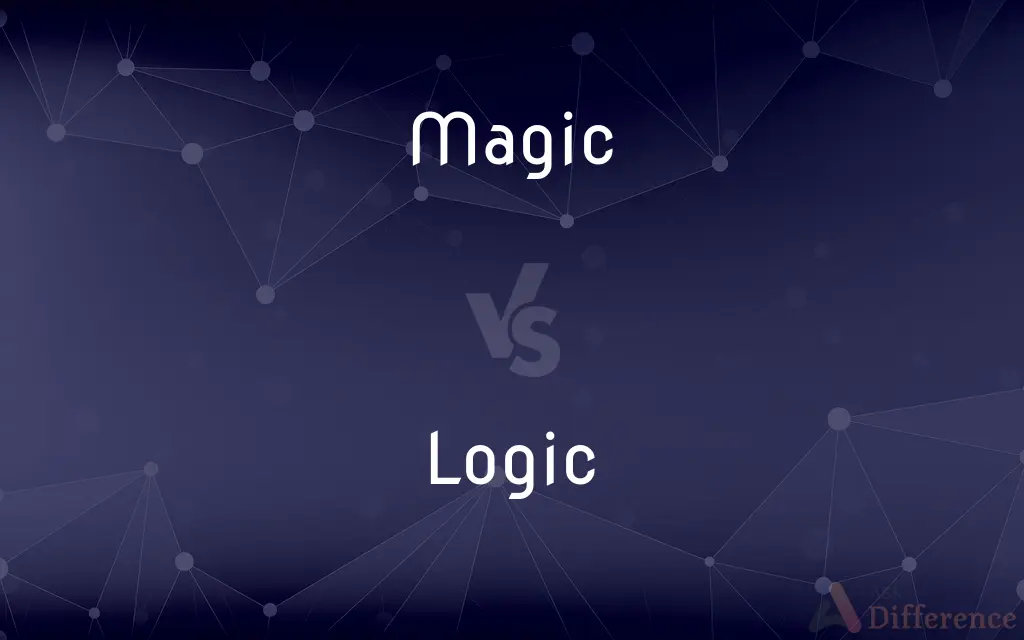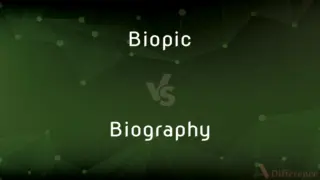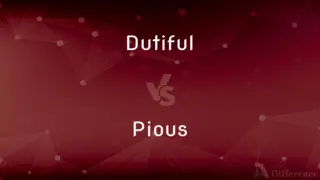Magic vs. Logic — What's the Difference?
By Tayyaba Rehman — Updated on September 19, 2023
Magic refers to the art of producing supernatural effects, often invoking the mystical. Logic is the systematic reasoning based on valid principles or evidence.

Difference Between Magic and Logic
Table of Contents
ADVERTISEMENT
Key Differences
Magic is often seen as an invocation of the mystical, supernatural forces, or unexplained phenomena. Logic, on the other hand, relies on systematic reasoning and clear-cut principles to derive conclusions or make decisions. In a sense, magic attempts to transcend the boundaries of our understanding, while logic seeks to meticulously define those boundaries.
Magic taps into the unknown, utilizing rituals, symbols, and various practices to manifest a desired outcome. Logic uses methodologies that can be scrutinized, dissected, and validated through empirical means. Both magic and logic strive for efficacy but approach it from fundamentally different angles.
Magic is rooted in belief, faith, or the power of suggestion and is not necessarily confined by the laws of nature. Logic operates strictly within the framework of rationality and the natural world, employing scientific principles and mathematical formulas. In other words, magic offers a way out of the maze, while logic provides a map of the maze itself.
Magic relies on a sense of wonder and the unquantifiable elements of human experience. Logic, in contrast, is grounded in observable facts and repeatable tests. The appeal of magic lies in its ability to provide instant gratification or an emotional experience, whereas logic appeals to the intellectual rigor of solving complex problems.
Comparison Chart
Nature
Supernatural
Rational
ADVERTISEMENT
Method
Rituals, symbols
Empirical evidence, reasoning
Framework
Not confined by natural laws
Strictly within natural laws
Appeal
Emotional, wonder
Intellectual, rigorous
Outcome Measurement
Subjective
Objective
Compare with Definitions
Magic
Magic is the art of producing supernatural effects or phenomena.
The magician wowed the audience with his magic tricks.
Logic
Logic is the use of mathematical or formal reasoning.
The logic gate in the computer chip allows for complex calculations.
Magic
Magic is something that enchants or delights, creating a sense of wonder.
There was magic in the air when they danced under the stars.
Logic
Logic is a system of principles that guide rational thought.
His explanation was flawed due to a lack of logic.
Magic
Magic refers to something inexplicable by natural laws.
The way the team came back to win the game was simply magic.
Logic
Logic is the methodical organization of ideas to reach a conclusion.
Her logic was so convincing that the jury acquitted the defendant.
Magic
The power of apparently influencing events by using mysterious or supernatural forces
Suddenly, as if by magic, the doors start to open
Logic
Logic is the practice of assessing situations or propositions based on evidence.
The detective used logic to piece together the clues of the case.
Magic
Having or apparently having supernatural powers
A magic wand
Logic
Logic (from Greek: λογική, logikḗ, 'possessed of reason, intellectual, dialectical, argumentative') is the systematic study of valid rules of inference, i.e. the relations that lead to the acceptance of one proposition (the conclusion) on the basis of a set of other propositions (premises).
Magic
Wonderful; exciting
It was a great time, magic
Logic
The study of principles of reasoning, especially of the structure of propositions as distinguished from their content, and of method and validity in deductive reasoning.
Magic
Move, change, or create by or as if by magic
He must have been magicked out of the car at the precise second it exploded
Logic
A system of reasoning
Aristotle's logic.
Magic
The art or practice of using charms, spells, or rituals to attempt to produce supernatural effects or control events in nature.
Logic
A mode of reasoning
By that logic, we should sell the company tomorrow.
Magic
The charms, spells, and rituals so used.
Logic
The formal, guiding principles of a discipline, school, or science.
Magic
The exercise of sleight of hand or conjuring, as in making something seem to disappear, for entertainment.
Logic
Valid reasoning
Your paper lacks the logic to prove your thesis.
Magic
A mysterious quality of enchantment
"For me the names of those men breathed the magic of the past" (Max Beerbohm).
Logic
The relationship between elements and between an element and the whole in a set of objects, individuals, principles, or events
There's a certain logic to the motion of rush-hour traffic.
Magic
Of, relating to, or invoking the supernatural
"stubborn unlaid ghost / That breaks his magic chains at curfew time" (John Milton).
Logic
The nonarithmetic operations performed by a computer, such as sorting, comparing, and matching, that involve yes-no decisions.
Magic
Possessing distinctive qualities that produce unaccountable or baffling effects.
Logic
Computer circuitry.
Magic
To produce, alter, or cause by or as if by magic
"Intelligent warm-hearted Gertrude had magicked him into happiness" (Iris Murdoch).
Logic
Graphic representation of computer circuitry.
Magic
To cause to disappear by or as if by magic. Used with away
His shoes had been magicked away in the night.
Logic
Logical
Magic
The application of rituals or actions, especially those based on occult knowledge, to subdue or manipulate natural or supernatural beings and forces in order to have some benefit from them.
Logic
(uncountable) A method of human thought that involves thinking in a linear, step-by-step manner about how a problem can be solved. Logic is the basis of many principles including the scientific method.
Magic
A specific ritual or procedure associated with such magic; a spell.
Logic
The study of the principles and criteria of valid inference and demonstration.
Magic
The supernatural forces which are drawn on in such a ritual.
Logic
The mathematical study of relationships between rigorously defined concepts and of mathematical proof of statements.
Magic
Something producing successful and remarkable results, especially when not fully understood; an enchanting quality; exceptional skill.
Logic
A formal or informal language together with a deductive system or a model-theoretic semantics.
Magic
Complicated or esoteric code that is not expected to be generally understood.
Logic
(uncountable) Any system of thought, whether rigorous and productive or not, especially one associated with a particular person.
It's hard to work out his system of logic.
Magic
A conjuring trick or illusion performed to give the appearance of supernatural phenomena or powers.
Logic
(uncountable) The part of a system (usually electronic) that performs the boolean logic operations, short for logic gates or logic circuit.
Fred is designing the logic for the new controller.
Magic
The art or practice of performing conjuring tricks and illusions.
Logic
To engage in excessive or inappropriate application of logic.
Magic
Having supernatural talents, properties or qualities attributed to magic.
A magic wand
A magic dragon
Logic
(transitive) To apply logical reasoning to.
Magic
Producing extraordinary results, as though through the use of magic.
A magic moment
Logic
(transitive) To overcome by logical argument.
Magic
Pertaining to conjuring tricks or illusions performed for entertainment etc.
A magic show
A magic trick
Logic
The science or art of exact reasoning, or of pure and formal thought, or of the laws according to which the processes of pure thinking should be conducted; the science of the formation and application of general notions; the science of generalization, judgment, classification, reasoning, and systematic arrangement; the science of correct reasoning.
Logic is the science of the laws of thought, as thought; that is, of the necessary conditions to which thought, considered in itself, is subject.
Magic
(colloquial) Great; excellent.
I cleaned up the flat while you were out. —Really? Magic!
Logic
A treatise on logic; as, Mill's Logic.
Magic
(physics) Describing the number of nucleons in a particularly stable isotopic nucleus; 2, 8, 20, 28, 50, 82, 126, and 184.
Logic
Correct reasoning; as, I can't see any logic in his argument; also, sound judgment; as, the logic of surrender was uncontestable.
Magic
(programming) Being a literal number or string value with no meaning or context, not defined as a constant or variable
The code is full of magic numbers and we can't figure out what they mean.
Logic
The path of reasoning used in any specific argument; as, his logic was irrefutable.
Magic
(transitive) To produce, transform (something), (as if) by magic.
Logic
A function of an electrical circuit (called a gate) that mimics certain elementary binary logical operations on electrical signals, such as AND, OR, or NOT; as, a logic circuit; the arithmetic and logic unit.
Magic
A comprehensive name for all of the pretended arts which claim to produce effects by the assistance of supernatural beings, or departed spirits, or by a mastery of secret forces in nature attained by a study of occult science, including enchantment, conjuration, witchcraft, sorcery, necromancy, incantation, etc.
An appearance made by some magic.
Logic
The branch of philosophy that analyzes inference
Magic
The art of creating illusions which appear to the observer to be inexplicable except by some supernatural influence; it includes simple sleight of hand (legerdemain) as well as more elaborate stage magic, using special devices constructed to produce mystifying effects; as, the magic of David Copperfield. It is practised as an entertainment, by magicians who do not pretend to have supernatural powers.
Logic
Reasoned and reasonable judgment;
It made a certain kind of logic
Magic
Pertaining to the hidden wisdom supposed to be possessed by the Magi; relating to the occult powers of nature, and the producing of effects by their agency.
Logic
The principles that guide reasoning within a given field or situation;
Economic logic requires it
By the logic of war
Magic
Performed by, or proceeding from, occult and superhuman agencies; done by, or seemingly done by, enchantment or sorcery; as, a magical spell.
The painter's magic skill.
Logic
A system of reasoning
Magic
Any art that invokes supernatural powers
Logic
Logic is the study of valid reasoning and argumentation.
The philosopher specialized in logic and ethics.
Magic
An illusory feat; considered magical by naive observers
Magic
Possessing or using or characteristic of or appropriate to supernatural powers;
Charming incantations
Magic signs that protect against adverse influence
A magical spell
'tis now the very witching time of night
Wizard wands
Wizardly powers
Magic
Magic is the use of spells or rituals often in religious or mystical traditions.
The witch performed magic to heal the sick villager.
Magic
Magic is the power to influence events or produce marvels using hidden forces.
The amulet is said to have magic powers that protect its wearer.
Common Curiosities
Is magic real?
Magic, in the sense of supernatural powers, is generally considered to be a part of folklore or mythology rather than proven fact.
What is magic?
Magic is the art or practice of producing supernatural effects or phenomena.
Is logic always accurate?
Logic is a tool for reasoning, and its accuracy depends on the premises and methods used.
What is logic?
Logic is the study and practice of valid reasoning and structured argumentation.
Is magic only for entertainment?
In popular culture, magic is often associated with entertainment, but it has cultural, religious, and historical contexts too.
Do magic and logic serve the same purpose?
No, magic often aims to evoke wonder or achieve supernatural effects, while logic seeks to understand through rational means.
Can magic and logic coexist?
While they operate on different principles, some individuals incorporate both magic and logic into their worldview.
How is magic used in literature?
Magic often serves as a plot device to introduce wonder, conflict, or otherworldly elements.
How is logic used in philosophy?
Logic is a foundational aspect of philosophy, used to examine arguments, ideas, and ethical principles.
Can logic be emotional?
Logic aims to be objective, but its application can be influenced by emotional reasoning.
How old are the concepts of magic and logic?
Both concepts have ancient origins, with magic appearing in early human history and logic formalized by the ancient Greeks.
Is magic always associated with witchcraft?
No, magic can appear in various forms and traditions, not always connected to witchcraft.
Can logic be flawed?
Logic can be flawed if it's based on incorrect premises or employs faulty reasoning.
What fields use logic?
Fields like mathematics, computer science, law, and philosophy commonly use logic.
Who practices magic?
Magicians, witches, and practitioners of various mystical or religious traditions may engage in magic.
Share Your Discovery

Previous Comparison
Biopic vs. Biography
Next Comparison
Dutiful vs. PiousAuthor Spotlight
Written by
Tayyaba RehmanTayyaba Rehman is a distinguished writer, currently serving as a primary contributor to askdifference.com. As a researcher in semantics and etymology, Tayyaba's passion for the complexity of languages and their distinctions has found a perfect home on the platform. Tayyaba delves into the intricacies of language, distinguishing between commonly confused words and phrases, thereby providing clarity for readers worldwide.
















































